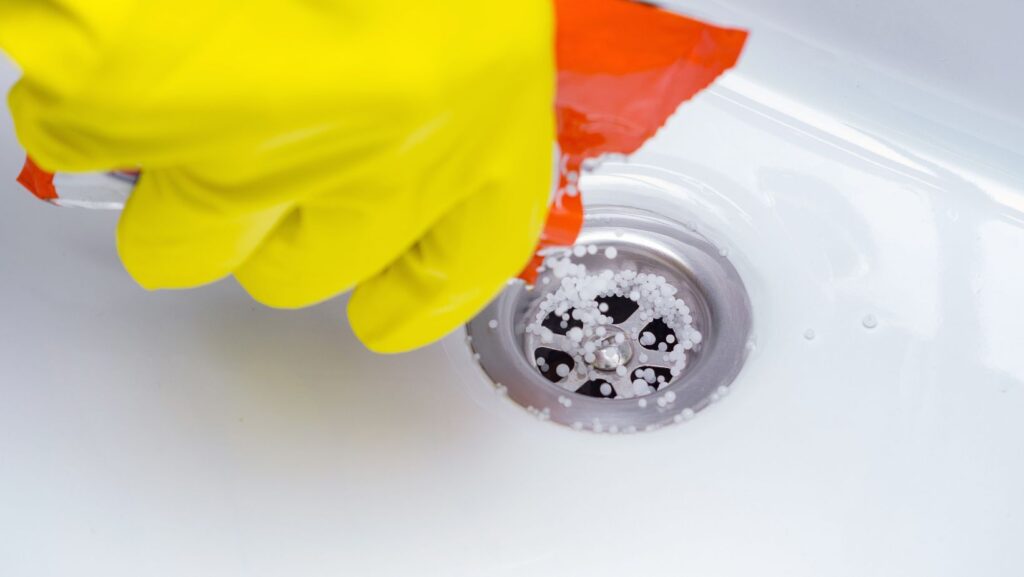
We’ve all been there – you’re faced with a clogged drain, and the quickest solution seems to be reaching for a chemical drain cleaner. It promises fast, easy results. But before you pour that toxic substance down the drain, it’s important to stop and consider the long-term effects. Not only can chemical drain cleaners harm your plumbing, but they can also damage the environment and even put your health at risk. In this post, we’ll explore why you should never rely on harsh chemicals and share some safer, eco-friendly alternatives that will keep your drains clear without the negative consequences.
Why Chemicals Don’t Solve the Problem
It might seem like chemical drain cleaners provide a quick and easy fix to a blocked drain, but the reality is that they only offer a temporary solution. While they can break down certain types of blockages, they don’t address the underlying causes. If you have a deeper clog further down the plumbing system, the chemicals may not even reach it. Worse still, they can lead to additional buildup in pipes, which means the problem could come back, often worse than before.
What’s more, chemicals don’t prevent future blockages. They simply break down the immediate clog but leave the root cause – whether it’s grease, food scraps, or hair – still in the pipe. So, before you know it, you’re back to square one, possibly using more chemicals and causing even more damage to your plumbing and the environment. Instead, look to hire professionals who will clear the blockage once and for all. You can read more about this type of service from FS Drainage.
Safer Alternatives to Chemical Drain Cleaners
The good news is that there are plenty of effective and environmentally friendly alternatives to chemical drain cleaners that don’t carry the same risks. Here are some of the best options:
Baking Soda and Vinegar
One of the easiest and safest ways to clear minor blockages is to use a combination of baking soda and vinegar. This natural duo works wonders in breaking down grease and food particles, plus it’s completely non-toxic. Simply pour half a cup of baking soda down the drain, followed by half a cup of vinegar. Cover the drain and let it sit for about 30 minutes. After that, pour hot water down the drain to clear any remaining debris. Not only is this method effective, but it’s also incredibly cheap and easy to do.
Hot Water
Sometimes, all you need is hot water to clear a blockage. Pouring a kettle of boiling water down the drain can loosen up grease, soap scum, and other gunk that may have built up in your pipes. This method is especially useful for kitchen sinks where grease is a common culprit. Just be cautious with older pipes, as sudden temperature changes can cause them to crack. A steady stream of hot water is all you need to help keep your drains clear.
Plunger or Drain Snake
If baking soda and vinegar don’t do the trick, try using a plunger or a drain snake. A plunger is an effective tool for dislodging minor clogs near the drain opening. For more stubborn blockages, a drain snake (or auger) can reach further into the pipes and break up tougher clogs. Both are easy-to-use tools that don’t require any chemicals, and they’re reusable, making them an eco-friendly option.
Enzyme-Based Cleaners
If you’re looking for something a bit stronger, enzyme-based drain cleaners are a safe, biodegradable option.

These cleaners use natural enzymes and bacteria to break down organic material, such as hair, food, and grease, in your pipes. They are effective and don’t contain any harsh chemicals, so they won’t damage your plumbing or pollute the environment. While they may take a little longer to work than chemical cleaners, they are a much safer choice in the long run.
Habits That are Damaging Your Drainage System
Most drain blockages can be avoided. This means that the power is in your hands and you can avoid having to hire professionals and spend money on unblocking. Unfortunately, there are common habits that homeowners get into that are causing damage to the drain. Let’s take a look at what they are so you can avoid going them yourself.
Pouring Grease Down the Drain
Are you guilty of pouring grease down the drain after cooking? You can be under the impression that this liquid is harmless. However, you have to consider when it cools down. it’s going to solidify. This is going to happen inside your drainage system, which means sticking to the pipes. This can cause a future blockage, especially if other debris gets stuck to it.
Flushing Wipes and Other Items
Always ensure that you have a bin in your bathroom. Otherwise, you can be tempted to flush items that you shouldn’t down the toilet. For example, things like sanitary products, wipes and floss shouldn’t be flushed down the toilet. Eventually, they can cause a clog, which can render your toilet out of service.
Using Chemical Cleaners
Some people like to try to be proactive and clean the drains. Indeed, they get strong cleaners you can find in the shops. Unfortunately, these can seem like a good idea, but they’re full of corrosive ingredients. You can end up damaging the pipes when you use these cleaners. Not only do they not always work for blockages, but they can actually burn through your pipes if they’re made from PVC. So, you could have an expensive repair on your hands.
Conclusion
Pouring chemicals down the drain might seem like the quickest way to clear a clog, but the risks far outweigh the benefits.

From damaging your pipes and harming the environment to putting your health in jeopardy, chemical drain cleaners should be avoided whenever possible. Thankfully, there are plenty of safer, eco-friendly alternatives that can keep your drains clear without causing harm. So next time you reach for that chemical bottle, consider giving one of these natural solutions a go – your pipes, health, and the planet will thank you.












